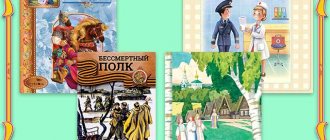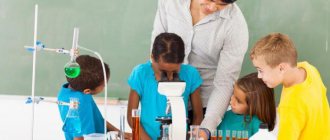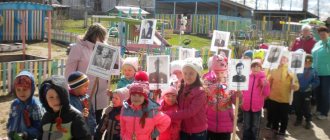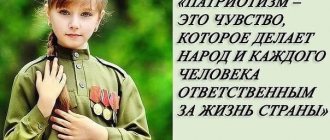Preparatory group. Senior preschool age. Children 6-7 years old
Project “My Small Motherland” for the preparatory group PROJECT “My Small Motherland”
PASSPORT OF THE PEDAGOGICAL
PROJECT Venue: MDOU kindergarten No. 12 “Berezka”
, village.
Stepnoye, Stepnovsky municipal district, Stavropol Territory Type of project Creative and informational Duration short-term (1 month)
Project participants • Children...
Long-term moral and patriotic project “My small Motherland - Proletarsk” for children of senior preschool age
I love this land With the blue sky, With the quiet rustle of grass. Birds spring trill. I love this region near the Cossack Don - This is my corner of my childhood cradle. (Vasily Tsyganenko)
Problem: The basis of
moral and patriotic education is the development of moral...
Educational project on moral and patriotic education in kindergarten. Senior group
Educational project for the 70th anniversary of Victory in the Great Patriotic War “No one is forgotten, nothing is forgotten...”
A project on the moral and patriotic direction of working with children in a speech therapy group.
The war has passed, the suffering has passed, But the pain calls out to people: Let us, people, never forget about this.
A. Tvardovsky Explanatory note
The problem of organizing the educational and developmental process in a mixed-age group of preschool educational institutions is very pressing today. Knowledge of the specifics of working with preschoolers, the ability to correlate the individual qualities of preschoolers with the goals and objectives of the educational program aims teachers at finding optimal forms of work. Project activity is undoubtedly such a form and is widespread in our work practice in preschool educational institutions. This project makes it possible to fully implement an educational program with pupils aged 5-7 years on cognitive development with a priority moral and patriotic direction. The patriotic focus of the project ensures that children develop patriotic feelings, love for the Motherland, pride in its achievements, and confidence that Russia is a great multinational country with a heroic past and a happy future. The moral orientation of the project ensures the development of respect for traditional values: love and respect for elders, caring attitude towards children and the elderly; instilling in children the desire to follow a positive example in their actions. The project implementation period is from April 1 to May 9, 2015. The project brings together teachers, pupils from 5 to 7 years old and parents of pupils.
Relevance of the project:
Every year there are fewer and fewer veterans of the Great Patriotic War.
We, the current generation, are obliged to remember those who forged Victory at the fronts and worked in the rear. It is the direct responsibility of adults to help preserve the memory of the heroic facts of our history, to instill in young citizens pride in their Motherland, and to nourish the receptive soul of a child with sublime human values. The period of preschool childhood is favorable for the emotional and psychological impact on the child, because the images of perception of reality and cultural space are very bright and strong and therefore remain in the memory for a long time, and sometimes for a lifetime, which is very important in the education of patriotism. Raising patriotism in preschool children means instilling attachment to their small Motherland, understanding and recognition of the elements of the historical and cultural heritage of their country, which in the future becomes the basis for the formation of pride, love and respect for the Fatherland. This is noted in the Concept of Patriotic Education of Citizens of the Russian Federation: “The education system is designed to ensure... the education of Russian patriots, citizens of a legal democratic, social state, respecting the rights and freedoms of the individual, possessing high morality and showing national and religious tolerance.” The authors of modern educational programs highlight the task of expanding the social competence of children in matters of social significance of the national holiday of Victory Day (E. S. Evdokimova, L. V. Kolomiychenko, L. A. Paramonova, etc.). Within the limits accessible to children, they emphasize the importance of introducing preschoolers to the fact that war is always a tragedy and grief for people. At the same time, it is important for children to learn to admire the courage and heroism of the people who defended their Homeland; experience your involvement with distant events of history, feel the joy of the Great Victory, pride in your Fatherland. In solving this problem today, an important role should be given to preschool education, since it is at preschool age that the basic moral qualities of a child are formed. In this regard, teachers of a preschool educational institution are faced with the task of developing in children citizenship, a sense of love and pride for their Motherland through the construction of an optimal pedagogical system aimed at developing the civic and patriotic qualities of preschoolers using modern multimedia technologies. One of the most effective methods of patriotic education is project activity, which allows you to create a natural situation of communication and practical interaction between children and adults. The project “Nobody is forgotten, nothing is forgotten...” is aimed not only at creating conditions for the formation of children’s ideas about the history of the Russian state during the Great Patriotic War, but it is also intended to give children the opportunity to reflect their ideas about these events in various types of activities. The idea of the project is this: on the basis of cognitive and creative activities, to develop children’s desire to learn as much as possible about the history of the country and city during the Great Patriotic War. The topic of the project is quite relevant at the present stage of social reality. The Federal State Educational Standard for Preschool Education calls one of the basic principles of preschool education: introducing children to sociocultural norms, traditions of the family, society and state. Project type: Educational and creative Implementation period: Project duration from April 1 to May 9, 2015. Project participants: Children of the speech therapy group aged 95-6 years), educators, preschool teachers and parents. Project goal: Formation of moral and patriotic feelings of pride in one’s Fatherland, one’s people, through a careful attitude to its history, based on expanding children’s ideas about the victory of the defenders of the Fatherland in the Great Patriotic War through socio-cultural and artistic and creative activities. Project objectives: 1. To introduce the history of the Great Patriotic War, full of examples of the greatest heroism and courage of people in the struggle for the freedom of the Motherland;
2. Introduce verbal art, develop artistic perception and aesthetic taste through familiarity with literary works about the war. 3. Clarify knowledge about the Victory Day holiday, explain why it is called that and who is congratulated on this day. 4. To develop moral and patriotic qualities: courage, courage, desire to defend one’s homeland. 5. Give children an idea that people remember and honor the memory of heroes in the Great Patriotic War of 1941-1945. 6. Introduce children to the military awards that were awarded to soldiers during the Great Patriotic War. 7. Organize cooperation with parents, provide support and assistance to families in instilling patriotic feelings in preschoolers. 8. To develop children’s productive activities and children’s creativity, to introduce works of art related to the theme of war and Victory Day. 9. Foster love and respect for veterans of the Great Patriotic War, a desire to take care of them. Forms of work on the project:
-classes;
- targeted walks; -excursions; -artistic and creative activities; -reading fiction; -examination of illustrations, photographs, newspapers; -listening to music; -observations. Project products. For children: - photo exhibition “Glory to our veterans!” — “Victory Day”, slide presentation for memory. For teachers: - presentation of the project at the teachers' council. For parents: - photo report “Lessons of the Great Patriotic War”;
For veterans: - cards and letters to veterans, made by the guys for ceremonial congratulations. Expected results of the project.
•Children’s understanding of the exploits of the Soviet people, the defenders of the fatherland and the heroes of the Great Patriotic War will expand; •Preschoolers will develop an attentive and respectful attitude towards veterans and elderly people, and a desire to provide them with all possible assistance. •Ability to present a creative product of individual and collective activity. •The quality of methodological support, self-improvement of professional skills included in new activities and its introduction into the practice of kindergarten work will increase. •The level of responsibility of teachers for the formation of patriotic feelings and civic position in children will increase. •The level of parental responsibility for the formation of patriotic feelings and civic position in children will increase. •Enrichment of methods, techniques, means and forms of patriotic education of preschool children. •Creation of a material and technical base for fruitful work on this topic. The project was planned and carried out in accordance with the federal state educational standard in five educational areas. Cognitive development:
GCD on topics:
- “Our dear Army”; - “Warrior-Soldier” - “Military Equipment” - “Children of War” - “Awards” - “Victory Day”.
Conversations with children on topics:
-"The Great Patriotic War "; - “Heroes of the Great Patriotic War”; - “Heroes who forged victory in the rear”; - "Conversations about military professions."
Artistic and aesthetic development:
-Drawings on the theme: “We remember and are proud!”; -Exhibition of military equipment collected by children; — Making holiday cards with parents; -Papier-mache sculpture “Military helmet”; -Origami “Victory Banner”, “Dove of Peace”; -Examination and discussion of reproductions: Yu. M. Neprintsev “Rest after the battle”; A. A. Deinek “Defense of Sevastopol”. -Listening to wartime music; -Learning the songs “Crippled Fire”, “Parade on Red Square”, “We want the birds to sing” -Learning the dance “Kalinka”, “Looking into the blue lakes”.
Speech development:
Reading works of fiction to children: -E. Blaginina “The Overcoat” -L. Kassil “Monument to the Unknown Soldier”, “Glorious Army”, -A. Mityaev “Dugout”, “Grandfather’s Order”, -E. Kuznetsov “Air raid warning”, -M. Plyatskovsky “May of forty-five” -A. Tvardovsky “The Tankman’s Tale” and others - Ch. S. Baruzdina “The country where we live - Learning poems about the Second World War. Physical development: - Sports competition for children of the preschool group - Initial drill training for boys of the senior subgroup.
Social and communicative development:
— Visit to the exhibition-museum in MOUSOSH No. 13 “Let’s bow to those great years”;
-Targeted walk to the memorial pedestal with parents on the weekend. -Speech at the gala celebration dedicated to the 70th anniversary of the Victory “The History of One Letter” Work with parents: - Design of parent corners;
-Consultations for parents “Introduce children to the heroic past of Russia”; -Recommendations for parents on home reading: A. Barto “At the Outpost”, S. Ya. Marshak “Border Guards”. - Issue of the “Glory Corner” in the parent’s corner with the names of the students’ grandfathers and great-grandfathers who participated in the Second World War. Project implementation plan.
Stage I - Preparatory stage. Immersion in the project.
1. Clarification of children’s ideas about the Great Patriotic War, about the participation of older generation family members in the war.
2. Statement of the problem: “Who are the defenders of the Motherland? What do we know about the war heroes in our family?” 3. Identify the opinion of parents on the issue of patriotic education of children based on familiarization with the Great Patriotic War, on the participation of older family members in the war. 4. Identification of project participants (teachers, children, parents, music director) Activities: 1. “Children of War” - Selection of thematic material (books, articles, presentation). 2. Design of a book exhibition and information corner.
3. Reading works of art to children: L. Kassil “Monument to the Unknown Soldier”, “Glorious Army”, A. Mityaev “Dugout”, “Grandfather’s Order”, E. Kuznetsov “Air Raid”. 4. Conversation “Our army is dear.” 5. Examination of illustrations of the military branches, photographs showing the everyday life of the army.
Stage II – the main one. Planning activities, drawing up a work plan and distributing tasks to children.
1. Determine areas of work, taking into account the age and individual characteristics of the child, develop a plan for project implementation.
2. Select the necessary material for organizing productive, playful, artistic, creative, and cognitive activities of children. 3. Selection of fiction about the war: for reading and designing an exhibition of books “They Defended Our Motherland” 4. Preparation of material for conducting conversations, for productive activities. 5. Selection of musical works on military subjects 6. Help of parents in creating an exhibition of photographs of the war years, awards (medals, orders), letters from the front (from the family archive) Events: 1. Exhibition of children's drawings “Colors of Victory”, dedicated to the 70th anniversary of the Victory .
2. Learning poems on military topics. 3. Excursion to the museum of school No. 13. A short story about the war and reading excerpts of poems. 4. Listening to songs about war: “Holy War” lyrics. V. Lebedev-Kumacha, “Victory Day” by D. Tukhmanov, M. Blanter “Katyusha”, V. Alkin “Farewell of a Slav”, “The Story of One Letter”, “Cranes”, “Blue Handkerchief”. 5. Making front-line letters (origami technique). 5. Watching cartoons on military topics. 6. Handmade “Gifts for Veterans”
7 Making a model in memory of fallen soldiers. "Obelisk"
10. Talking about letters from the front that came to families during the Second World War. 11. “Read a book about the war” (home family reading). 12. Conversations: “What is heroism”, “Children during the war”, “We remember heroes”. 14. Organization of a mini-museum “Glory to our veterans.” 15. Educational conversation: “Victory Day.” 16. GCD “Spring. Victory Day". 17. Origami “Doves of Peace”. 18. Didactic game “Orders and medals.” 19. “This Victory Day” - development of a script for an event dedicated to Victory Day. 20. Examination of photographs of the war years, awards (medals, orders) that were awarded to war heroes. 21. Compilation and recording by parents of short stories on the topic “My grandfather (grandmother) is a hero” (about the history of their family during the war, about relatives who participated in the Great Patriotic War 22. Drawing competition on asphalt “70 years of Victory.” “Thank you “To you, for the victory!”
23. Viewing the presentation “Victory Day” 24. — Preparation for the festive event for Victory Day.
Stage III - Final. Presentation of results.
-Celebratory event for Victory Day -Presentation of results.
-Congratulations to veterans on Victory Day! Events: 1. Concert dedicated to the celebration of the 70th anniversary of the Second World War. Musical and literary composition “The Story of One Letter” 2. Laying flowers at the Victory Monument.
(with parents) 4. Creating a festive atmosphere on Victory Day, the desire to say “Thank you!” surviving veterans. Give gifts made for veterans at the Victory Parade. Results of the project.
Thanks to the project, children received the necessary information about the people who fought in the war, about the children of the war, and about the hardships of those years. They retained an interest in the history of their Motherland, in their defenders. Parents actively took part in the implementation of the project and realized the importance of patriotic education among preschoolers.
We recommend watching:
Scenario of outdoor physical education for children of the senior preparatory group, May 9 - Day Project in the senior group of the kindergarten “For children about the Great Patriotic War” Project in the preparatory group of the kindergarten “Children about the Great Patriotic War” Project for Victory Day in kindergarten. Senior preschool age
Similar articles:
Summary of a lesson on social and communicative development in the senior group by May 9
Scenarios for May 9 in kindergarten. Senior - preparatory group



